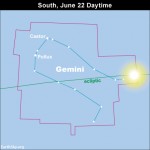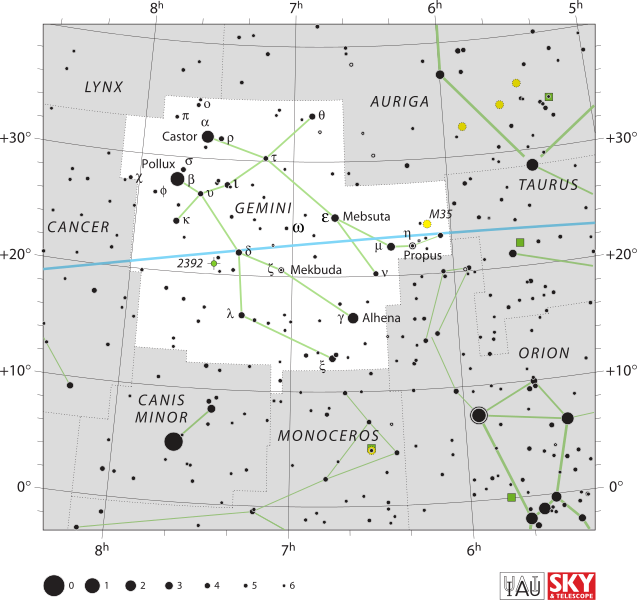
At the June 20, 2020, solstice, the sun is in front of the constellation Taurus the Bull. On June 21, at around 09:00 UTC, the sun moves out of the constellation Taurus and into the constellation Gemini the Twins. In other words, the sun on the June solstice shines very close to the Taurus-Gemini border.
Relative to the backdrop stars of the zodiac, the sun on the solstice always appears a tiny bit westward of the previous year’s solstice sun.

As seen from Earth, the sun travels in front of the constellation Gemini the Twins from June 22, 2019 at around 03:00 UTC, until July 21 at about 07:00 UTC. Translate UTC to your time. The solstice point is at the intersection of 6h with the ecliptic.
Thirty-one years ago, in the year 1989, the sun was in front of the constellation Gemini on the June solstice. Then in the following year, in 1990, the June solstice sun shone in front of the constellation Taurus, the constellation to the immediate west of Gemini. The sun on the June solstice will continue to shine in front of Taurus until the year 4609, when the June solstice sun will finally move into the constellation Aries, the constellation to the immediate west of Taurus.
Enjoying EarthSky so far? Sign up for our free daily newsletter today!
Sign versus constellation
Please keep in mind that we’re talking about constellations – not astrological signs – of the zodiac.
By definition, the sun occupies the first point of (the sign) Cancer on the June solstice, irrespective of which constellation backdrops the sun at this time. Also, the sun reaches the first point of (the sign) Leo when it resides 30 degrees east of the June solstice point along the ecliptic – regardless of which constellation backdrops the sun.
Signs are fixed relative to the solstice and equinox points. On the other hand, the solstice and equinox points slowly but surely move westward relative to the zodiacal constellations.
The solstice and equinox points go full circle through the constellations of the zodiac in about 26,000 years.
Bottom line: On June 21, 2020, at around 09:00 UTC, the sun moves out of the constellation Taurus the Bull and into Gemini the Twins.
EarthSky astronomy kits are perfect for beginners. Order today from the EarthSky store
Donate: Your support means the world to us
from EarthSky https://ift.tt/2NjkC5j

At the June 20, 2020, solstice, the sun is in front of the constellation Taurus the Bull. On June 21, at around 09:00 UTC, the sun moves out of the constellation Taurus and into the constellation Gemini the Twins. In other words, the sun on the June solstice shines very close to the Taurus-Gemini border.
Relative to the backdrop stars of the zodiac, the sun on the solstice always appears a tiny bit westward of the previous year’s solstice sun.

As seen from Earth, the sun travels in front of the constellation Gemini the Twins from June 22, 2019 at around 03:00 UTC, until July 21 at about 07:00 UTC. Translate UTC to your time. The solstice point is at the intersection of 6h with the ecliptic.
Thirty-one years ago, in the year 1989, the sun was in front of the constellation Gemini on the June solstice. Then in the following year, in 1990, the June solstice sun shone in front of the constellation Taurus, the constellation to the immediate west of Gemini. The sun on the June solstice will continue to shine in front of Taurus until the year 4609, when the June solstice sun will finally move into the constellation Aries, the constellation to the immediate west of Taurus.
Enjoying EarthSky so far? Sign up for our free daily newsletter today!
Sign versus constellation
Please keep in mind that we’re talking about constellations – not astrological signs – of the zodiac.
By definition, the sun occupies the first point of (the sign) Cancer on the June solstice, irrespective of which constellation backdrops the sun at this time. Also, the sun reaches the first point of (the sign) Leo when it resides 30 degrees east of the June solstice point along the ecliptic – regardless of which constellation backdrops the sun.
Signs are fixed relative to the solstice and equinox points. On the other hand, the solstice and equinox points slowly but surely move westward relative to the zodiacal constellations.
The solstice and equinox points go full circle through the constellations of the zodiac in about 26,000 years.
Bottom line: On June 21, 2020, at around 09:00 UTC, the sun moves out of the constellation Taurus the Bull and into Gemini the Twins.
EarthSky astronomy kits are perfect for beginners. Order today from the EarthSky store
Donate: Your support means the world to us
from EarthSky https://ift.tt/2NjkC5j

Aucun commentaire:
Enregistrer un commentaire